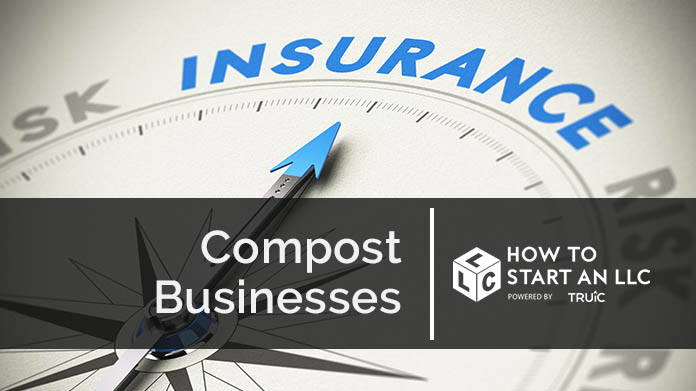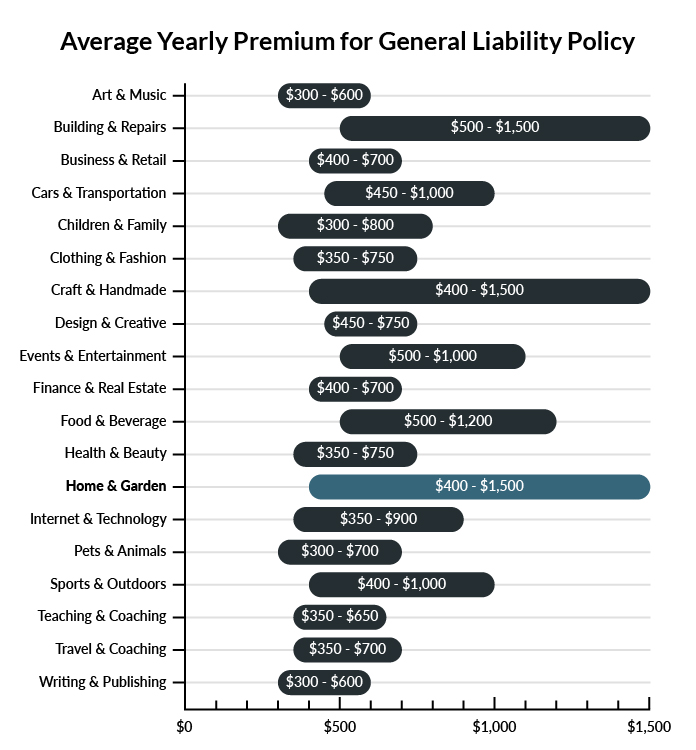Compost Business Insurance
Getting insurance for your compost business is essential.
Compost businesses need to be protected against things like claims of product liability, employee injuries, and environmental contamination.
For example, your business is sued for environmental contamination for failure to properly dispose of its waste materials, or a storm causes significant damage to your composting equipment.
We’ll help you find the most personalized and affordable coverage for your unique business.

Recommended: Ergo Next Insurance is dedicated to matching small businesses with the right policy at the best price.
Best Insurance for a Compost Business
General liability insurance is — generally speaking — one of the most important insurance policies for compost businesses.
Some of the risks general liability insurance covers are:
- Bodily injury
- Property damage
- Medical payments
- Legal defense and judgment
- Personal and advertising injury
Many compost businesses find that general liability is insufficient by itself in providing comprehensive protection, and so decide to utilize several additional policies, including:
- Commercial property insurance
- Business interruption insurance
- Workers’ compensation insurance
- Commercial auto insurance
- Product liability insurance
- Commercial umbrella insurance
It is important to be aware of the different types of insurance providers and their unique pros and cons. Generally, they are divided into two distinct categories:
- Traditional brick-and-mortar insurers — This typically describes older, more established firms that are based in a physical location (such as Hiscox and The Hartford).
- Online insurers — Contrastingly, this tends to refer to newer firms that base themselves almost entirely online (e.g., Ergo Next and Tivly).
Let’s Find the Coverage You Need
The best insurers design exactly the coverage you need at the most affordable price.
Cost of General Liability Insurance
The average compost business in America spends between $400-$1,500 per year for $1 million in general liability coverage.
Compare the average cost of general liability insurance for a compost business to other professional industries using the graph below.
Several factors will determine the price of your policy. These include your:
- Location
- Deductible
- Number of employees
- Per-occurrence limit
- General aggregate limit
You may be able to acquire general liability insurance at a discounted rate by purchasing it as part of a business owner’s policy (BOP) rather than as a standalone policy.
A BOP is a more comprehensive solution that includes multiple forms of coverage, such as business interruption and property insurance.

Find the Best Rate
Discover the best coverage at the lowest rate in our cheapest business insurance review.
Common Situations That General Liability Insurance May Cover for a Compost Business
Example 1: After purchasing your product, a commercial farmer accuses you of selling unsafe compost laced with harmful chemicals and sues you for endangering his livelihood. General liability insurance would cover your legal fees as well as the cost of any settlement.
Example 2: While a prospective client visits your composting facility, she trips on an uneven patch of land and claims you’re at fault because you didn’t display a warning sign near the dangerous ground. General liability insurance would cover her medical bills and your legal fees in the event of a lawsuit.
Example 3: Your compost pile attracts a venomous snake that bites a repeat customer. General liability insurance would cover the customer’s related medical treatment.
Other Types of Coverage Compost Businesses Need
While general liability is the most important type of insurance to have, there are several other forms of coverage you should be aware of. Below are some of the most common types of coverage:
Commercial Property Insurance
Your compost business needs space to create your core product. If you own the land on which you operate, commercial property insurance protects the grounds as well as the business equipment and product you store there. If a strong storm ruins all of your compost, for example, commercial property insurance would cover the cost of replacing your lost product so you can recover quickly.
Business Interruption Insurance
Because composting depends heavily on the quality and quantity of your land, you may need to close for weeks or months if inclement weather or vandalism renders that land unfit for business use. Business interruption insurance would cover some of your lost revenue, helping to ensure you don’t go out of business before you can reopen.
Workers’ Compensation Insurance
Most states require businesses to carry workers’ compensation insurance for their part-time and full-time employees. This coverage protects your employees if they become injured at work or fall ill after a work-related accident — including respiratory diseases, chronic muscle aches, or fungal infections. It not only covers an employee’s medical bills and lost wages if they need time to recover, but also any disability or death benefits stemming from a work-related accident.
Commercial Auto Insurance
Any vehicle you or your employees use primarily for business — such as to transport your compost — requires commercial auto insurance to protect the vehicle, driver, and others on the road in the event of an accident. Be sure to select a policy that covers not only accident-related vehicle repair costs and medical treatment for anyone injured but also sufficient protection for any business-related equipment you carry in your vehicles.
Product Liability Insurance
This coverage offers additional protection in the event you sell a defective product. If someone claims your compost caused them injury or illness, product liability insurance would cover your legal fees and any court-awarded damages.
Commercial Umbrella Insurance
While your general liability insurance policy covers most claims, some accidents or lawsuits may be so catastrophic that they threaten to exhaust the limits of your primary coverage. Commercial umbrella insurance protects you from paying out-of-pocket for any legal fees and awarded damages that exceed your primary policy.
Additional Steps To Protect Your Business
Although it’s easy (and essential) to invest in business insurance, it shouldn’t be your only defense.
Here are several things you can do to better protect your compost business:
- Use legally robust contracts and other business documents. (We offer free templates for some of the most common legal forms.)
- Set up an LLC or corporation to protect your personal assets. (Visit our step-by-step guides to learn how to form an LLC or corporation in your state.)
- Stay up to date with business licensing.
- Maintain your corporate veil.
Compost Business Insurance FAQ
Yes, absolutely. You will need to first get a quote from an online business insurance provider like Ergo Next Insurance. Ergo Next allows you to then purchase a policy immediately and your coverage will be active within 48 hours.
A typical business owner’s policy includes general liability, business interruption, and commercial property insurance. However, BOPs are often customizable, so your agent may recommend adding professional liability, commercial auto, or other types of coverage to your package depending on your company’s needs.
“Business insurance” is a generic term used to describe many different types of coverage a business may need. General liability insurance, on the other hand, is a specific type of coverage that business owners need to protect their assets.
Generally, yes. In order to secure the long-term success of your compost business, it will need sufficient business insurance to protect it from the inherent risks it faces (e.g., claims of environmental contamination or product liability).
Furthermore, it is also possible that your business requires certain types of insurance before starting in order to maintain compliance with your state’s laws.
Not necessarily. Certain exceptions may be written directly into your compost business insurance policy, and some perils may be entirely uninsurable.
Yes, an LLC is meant to create a legal barrier between your business and your personal assets and credit. If you haven’t formed an LLC yet, use our Form an LLC guide to get started.
An LLC doesn’t protect your business assets from lawsuits and liability– that’s where business insurance comes in. Business insurance helps protect your business from liability and risk.